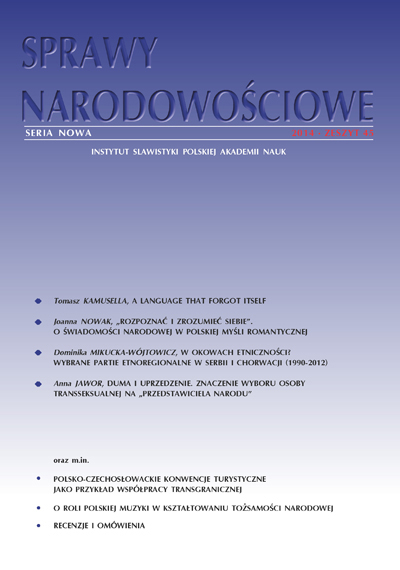Sprawy Narodowościowe
Nationalities Affairs
Publishing House: Instytut Slawistyki Polskiej Akademii Nauk
Subject(s): Politics / Political Sciences, History, Social Sciences, Language and Literature Studies
Frequency: 2 issues
Print ISSN: 1230-1698
Online-ISSN: 2392-2427
Status: Active
- 2004
- 2005
- 2006
- 2007
- 2008
- 2009
- 2010
- 2011
- 2012
- 2013
- 2014
- 2015
- 2016
- 2017
- 2018
- 2019
- 2020
- 2021
- 2022
- 2023
- Issue No. 24-25
- Issue No. 26
- Issue No. 27
- Issue No. 28
- Issue No. 29
- Issue No. 30
- Issue No. 31
- Issue No. 32
- Issue No. 33
- Issue No. 34
- Issue No. 35
- Issue No. 36
- Issue No. 37
- Issue No. 38
- Issue No. 39
- Issue No. 40
- Issue No. 41
- Issue No. 42
- Issue No. 43
- Issue No. 44
- Issue No. 45
- Issue No. 46
- Issue No. 47
- Issue No. 48
- Issue No. 49
- Issue No. 50
- Issue No. 51
- Issue No. 52
- Issue No. 53
- Issue No. 54
- Issue No. 55
Articles list
{{ article.TitleOriginalLanguage }}
{{ article.TitleOriginalLanguage }}
({{ article.TitleEnglish }})
- Publication: {{ article.Publisher }} ({{ article.Issue }})
- Author(s): {{ article.Authors }}
- Contributor(s): {{ article.Contributors }}
- Language: {{ article.Language }}
- Subject(s): {{ article.Subjects }}
- Issue: {{ article.Issue }}
- Page Range: {{ article.PageRange }}
- No. of Pages: {{ article.NumberOfPages }}
- Keywords: {{ article.Keywords }}
- Summary/Abstract: {{ article.SummaryAbstract }}
- Price: {{ common.currency(article.Price) }}
Short Description
Sprawy Narodowościowe. Seria nowa / Nationalities Affairs (SNSN) is the leading Polish journal devoted to nationalism and ethnicity, publishing articles in humanities and social sciences. The aim of the journal is to provide a platform for transdisciplinary research on nationalisms and ethnic issues, especially in Central Europe. The subject area in focus is the empirical and theory-oriented study of nationalism and ethnicity, pursued with a view to making a contribution to the development of Central European area studies. The SNSN is different from other journals in the field owing to its firm focus on Central Europe, understood as a constellation of ideas which is embodied in space. This concept of Central Europe includes both Slavic countries and their non-Slavic neighbours (e.g. Albania, Austria, the Baltic States, Greece, Hungary, Moldova, Romania). This approach to Central Europe requires the examination of reciprocal relations with cultures in relatively close geographical proximity, which were often the source of ideas proliferating in the region (e.g. Germany, Italy, Scandinavian countries, Turkey). Likewise, it does not exclude Russia as the most influential neighbouring state.
The journal is listed in CEEOL, DOAJ, EBSCO, ProQuest and Crossref databases. It is included in the Polish ranking of academic journals of the Ministry of Education and Science; the number of points awarded for published contributions is 40.

